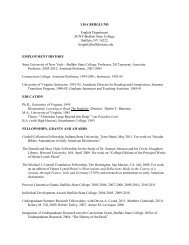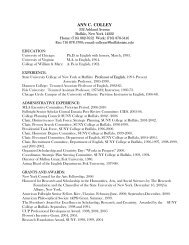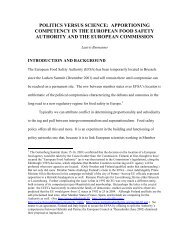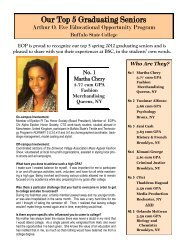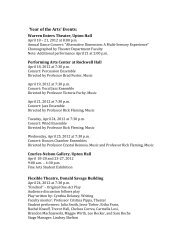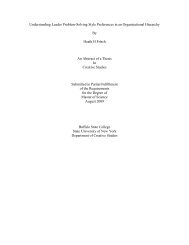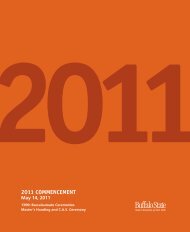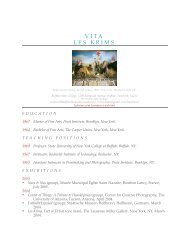Arts - Buffalo State College
Arts - Buffalo State College
Arts - Buffalo State College
Create successful ePaper yourself
Turn your PDF publications into a flip-book with our unique Google optimized e-Paper software.
108<br />
Psychology and Social Sciences<br />
ADHD and Adjustment To <strong>College</strong>: Major<br />
Changes and Grade Retention<br />
Amanda Grenier, Psychology<br />
Faculty Mentor: Professor Jill Norvilitis, Psychology<br />
There have been several recent studies pertaining to ADHD and<br />
its effects on college students’ academic success as well as students’<br />
ability to adjust to their academic lives. However, less research has<br />
been conducted on the effects that ADHD symptoms have on aspects<br />
of college such as course failure, knowledge of college policies,<br />
frequency of major changes, and the number of colleges students<br />
attend. I hypothesize that those with ADHD symptoms will take<br />
longer to graduate and will be more likely to change majors due to<br />
impulsivity. I further hypothesize that those with more symptoms will<br />
be less aware of college policies. Because colleges are concerned with<br />
retention and graduation rates, it would be beneficial to determine<br />
whether or not symptoms of ADHD have any relationship with these<br />
factors in order to enhance retention rates. Data are currently being<br />
collected and results will be presented at the celebration.<br />
Presentation Type and Session: Poster IV<br />
ADHD Symptomology In the Elderly<br />
Mary Wagner, Psychology<br />
Faculty Mentor: Professor Jill Norvilitis, Psychology<br />
ADHD is commonly diagnosed in childhood, but many adults<br />
continue to live with undiagnosed and untreated ADHD. The<br />
present study sought to examine ADHD symptomatology in the<br />
elderly population. Many individual in their 60’s, 70’s, 80’s and 90’s<br />
may continue to live with undiagnosed and untreated ADHD. The<br />
estimated prevalence of ADHD in adults is about 4-5%, but little is<br />
known about prevalence or symptomatology in the elderly. Among<br />
adults, ADHD symptoms are associated with continued risks and<br />
problems such as higher rates of traffic accidents, more job turn<br />
over, higher divorce rates, less satisfaction in relationshipfs, poor<br />
money management and impulsive shopping. The study investigated<br />
the similarity of patterns of known childhood and adulthood ADHD<br />
behavior and risk to retrospective reports of ADHD behaviors<br />
reported by the elderly. The results indicated that, when controlling<br />
for both gender and cognitive function, those who reported more<br />
childhood symptoms of ADHD also reported more difficulties with<br />
relationships and money management throughout their adult lives.<br />
Presentation Type and Session: Poster V<br />
Alternative Political Thought and Real<br />
Political Practice<br />
Robert Horwitz, PSC 470: Senior Seminar<br />
Faculty Mentor: Professor Patrick McGovern, Political Science<br />
There is continuing controversy as to whether unconventional<br />
or conventional modes of political participation are more effective<br />
in achieving the goals of environmental protection. The Earth<br />
Liberation Front (ELF), an international group of environmentalist<br />
working through covert cells around the world, utilizes<br />
unconventional political participation to protect the environment.<br />
For the past two decades these “eco-terrorists” have used arson,<br />
sabotage and intimidation to harass corporations, businesses and<br />
other organizations that harm the environment. I hypothesize that<br />
the ELF as a whole has been successful in achieving their long-term<br />
objective of environmental protection without directly physically<br />
harming animals and humans. For the purposes of my research<br />
I have created a database of ELF actions from 1996-2009, taking<br />
into account the type of unconventional action and the long-term<br />
effects that it had in protecting the environment directly. From these<br />
actions I will be employing a stratified sample that will provide two<br />
ELF actions from each of three different categories. These categories<br />
are based on an ordinal scale ranging from small, medium, and<br />
large ELF operations as determined the amount of property damage<br />
they caused ($1 – $99,999, $100,000 - $999,999, $1000,000+).<br />
Environmentalists and law enforcement officials will be interviewed<br />
as well to help assess the impact of ELF actions. The results from<br />
this study may be useful for other citizen groups as to whether<br />
unconventional political participation is an effective strategy in<br />
achieving their stated goals.<br />
Presentation Type and Session: Poster V<br />
The Ambassador Shuffle<br />
Sarah Brown, HON 400: All <strong>College</strong> Honors Colloquium<br />
Faculty and Staff Mentors: Professor Andrea Guiati, Director, All<br />
<strong>College</strong> Honors Program and Ms. Jessica Eagen, Undergraduate<br />
Admissions<br />
As a Student Ambassador there are several responsibilities<br />
within the Undergraduate Admissions Office of <strong>Buffalo</strong> <strong>State</strong><br />
<strong>College</strong>. Checking e-mail, making telephone calls, and providing<br />
tours are just the tip of the iceberg. Student Ambassadors work with<br />
prospective students to make their opinion of <strong>Buffalo</strong> <strong>State</strong> <strong>College</strong><br />
the best that it can be. Do Student Ambassadors actually make a<br />
difference on the campus? With tours being the focal point of the<br />
program, what is the percentage of students who take tours and<br />
then decide to attend <strong>Buffalo</strong> <strong>State</strong> <strong>College</strong>? This project will look at<br />
how many prospective students take a campus tour and then attend<br />
<strong>Buffalo</strong> <strong>State</strong> <strong>College</strong> as a freshman. This data will also be compared<br />
to the total number of prospective students that take campus tours.<br />
The research completed includes comparing the sign in sheets of<br />
each daily tour from January 2010 through August 2011, versus<br />
the list of deposited freshman students from the spring and fall<br />
2011 semesters. Completed surveys from tour participants will also<br />
be examined to see how the Student Ambassadors are performing<br />
on their tour. To wrap up the project, a look as to what current<br />
Ambassadors believe it means to be an Ambassador will also be<br />
examined. Presented as a poster and portfolio, this project will give<br />
an in-depth look into what the role of an Ambassador is and why




